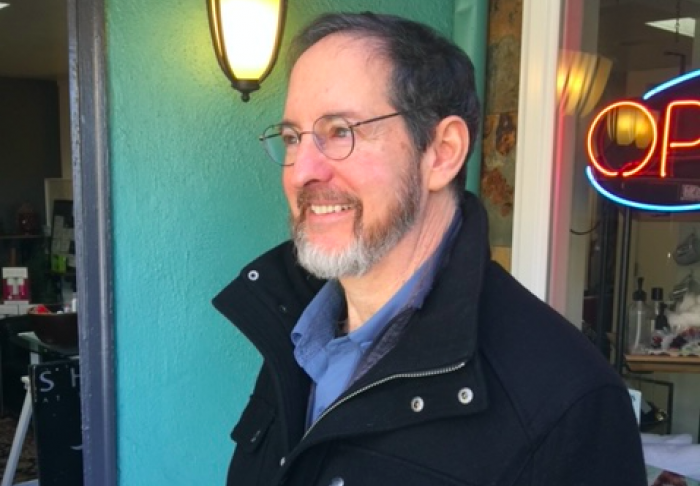After 17 years of mindful yoga and meditation, you’d think I would have arrived at a calm self-acceptance.
But there’s a part of me I don’t rest easy with. It’s the ordinary schmoe part—the part that doesn’t stand out, is not special, and just goes about my life in an utterly unremarkable way.
I’ve heard many times that to be mindful is to see the special in the ordinary. So, instead of seeing just the flat sidewalk I’m walking on, my mindful self might see the lone blade of grass poking out from a crack. And perhaps, I’d not only see the grass, but I’d also find it awesome…or at least worthy of appreciative attention.
But my own ordinariness feels more like the boring sidewalk than the striking blade of grass.
“What’s wrong with a sidewalk?” I ask myself. It’s stable—no neurotic drama there.
But something does feel wrong and unworthy.
My sidewalk-self walks alone. Who would want to come over and join me in my flat dullness?
Courage.
Courage stirs me to act as if my ordinariness deserves my respect even when I doubt this to be true.
I’m fortifying mindfulness with courage as I write this piece.
My impulse is to not write. Who wants to read something from me that others—the kind of authors who write for “The New Yorker” and “The Atlantic”—could say in more interesting and artful ways?
But then I recruit my courage—I draw it into the game. I even do some warrior poses in yoga to embody courage in physical forms that are familiar to me but still freshly energizing.
A Mini-Case Study
So, what does the courage to be ordinary look like for me, beyond writing?
Here’s an example:
Yesterday morning, as I walked on a long stretch of Santa Monica Boulevard in Los Angeles, where I was visiting family, I came upon a middle-aged man who was clearly down on his luck. He was sitting on the sidewalk—or more like sagging into the sidewalk—surrounded by stray items of clothing and half-empty plastic bottles of household items, like shampoo.
My first reaction was to be afraid of how he might act. I worried that he would start shouting at me to give him money—a fear that grew out of past experiences I’ve had elsewhere.
As I safely walked past this gentleman, I quietly hoped he would find better times. But mainly, what I did was breathe a sigh of relief and resume my search for a Starbucks.
Later, as I sipped an iced coffee, I grew disappointed in myself. Where was my heartfelt empathy? Why hadn’t I been able to walk in the sidewalk-sitting man’s shoes and feel in my bones the helplessness, resignation, or bitterness that he must have been feeling? Had I no sense of shared humanity?
I longed to be more naturally virtuous. Wouldn’t I like myself more and be more worthy of others’ respect if I were more empathetic to the struggles that people like the man on the sidewalk were enduring?
Wouldn’t it be great if I could trade in my small, morally ordinary self for a large, morally noble one?
But this longing to escape my ordinariness seemed pointless. It served to keep me small. Dreaming about being naturally grander than I was got in the way of growing toward a slightly better version of myself.
I sensed that this better version could still be ordinary. No heroics required. There was space to inhabit a more aware and compassionate self without chasing an illusion of pure moral enlightenment or effortless altruism.
The courage I needed was to do good in quiet ways that nobody might hear. I might feel alone with my limited self, with nothing to prop me up but the intuitive truth that walking toward people in need—however haltingly—is the right path.
When I got back to my home city, I thought about small steps I might take to contribute to actual improvement in the lives of homeless people in our community. I knew not to hold myself accountable to standards of personal and social transformation because when I brushed against the edges of my ordinariness, I’d use those standards as a club to beat myself up.
But I did come to a place of modest, but attainable action. I wrote an email to a City Council member expressing support for a proposal to prioritize particular types of services to homeless individuals. I made a donation to a highly respected nonprofit that served the needs of people without places to stay. And I resolved to attend the next few City Council meetings in which the issue of homelessness was on the agenda.
These ordinary actions did not pump me up. They did not make me feel any less flawed or limited. I knew I wasn’t a more virtuous person because I did a few little things.
But in the cracks of my ordinary self, a blade of courage seemed to reach toward the sun. The courage wasn’t about saving the world in the face of great odds. It was about facing my ordinariness and not using it as an excuse to do nothing or escape into fantasies about who or what I might become.
For me, the courage to be ordinary is the resolve to be my best self—not to invent a different one.












Read 6 comments and reply